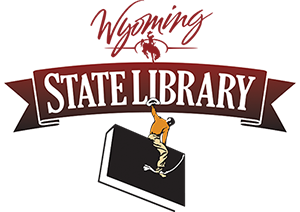It’s that time of year again! Ghosts, ghouls and things that go bump in the night! Halloween is a time for costumes, spooky stories and Trick-or-Treaters. Intellectual Property isn’t the first phrase that comes to mind when thinking of Halloween celebrations. However, there are patents for every occasion, including Halloween! Here are a few of the Halloween-themed patents we found searching the United State Patent and Trademark Office (USPTO).
Click the images to see each full-sized, or click the patent number to see the full patent filing at the USPTO. And, as always, know that you can use our Patent and Trademark Resource Center for all your intellectual property questions, or contact us at (307) 777-6333 or statelibrary@wyo.gov.
Enjoy!
[su_table]

Design for a Paper Sheet or Similar Article (U.S. Patent Design D46,178). Patented in 1914 by Clara L. Mead. The design is a number of specters or ghostly figures shrouded and with death’s heads, each provided with a jack o’lantern. |
 Natural Creeping Baby Doll (U.S. Patent No. 118,435. This patent was granted in 1871 to George Pemberton. According to his patent, Clarke wanted to improve the construction and operation of creeping (crawling) dolls. He wanted to mimic the natural movement of a baby. Natural Creeping Baby Doll (U.S. Patent No. 118,435. This patent was granted in 1871 to George Pemberton. According to his patent, Clarke wanted to improve the construction and operation of creeping (crawling) dolls. He wanted to mimic the natural movement of a baby. |
 Improvement in Coffins (U.S. Patent Number 212,273). Patented in 1879 by James Shannon. In 1879, James Shannon created a fastener to “prevent the displacement of the corpse in a coffin during the transfer of the remains down a flight of steps or stairway to the ground floor of a house, when the corpse is apt to slip to the lower end of the coffin and to steady the remains in the casket while in the hearse and on the route to the cemetery or place of interment.” Improvement in Coffins (U.S. Patent Number 212,273). Patented in 1879 by James Shannon. In 1879, James Shannon created a fastener to “prevent the displacement of the corpse in a coffin during the transfer of the remains down a flight of steps or stairway to the ground floor of a house, when the corpse is apt to slip to the lower end of the coffin and to steady the remains in the casket while in the hearse and on the route to the cemetery or place of interment.” |
 Ventriloquist’s Dummy (U.S. Patent No.2,114,851). Patented in 1938 by Martha McCown. According to the patent, McCown wanted to create a dummy that was durable and could be manufactured at a low cost. Ventriloquist’s Dummy (U.S. Patent No.2,114,851). Patented in 1938 by Martha McCown. According to the patent, McCown wanted to create a dummy that was durable and could be manufactured at a low cost. |
 Bleeding Costume Helmet (U.S. Patent No. 6,093,475). Patented in 2000 by Alan Geller. A costume element having an inner layer and at least in part transparent outer layer forming a passage there between, the passage having an upper opening. A fluid visible in at least a part of the passage is injected into the passage through the upper opening. A lower opening to the passage can be coupled to the upper opening by one or more tubes providing fluid communication and a pump. Bleeding Costume Helmet (U.S. Patent No. 6,093,475). Patented in 2000 by Alan Geller. A costume element having an inner layer and at least in part transparent outer layer forming a passage there between, the passage having an upper opening. A fluid visible in at least a part of the passage is injected into the passage through the upper opening. A lower opening to the passage can be coupled to the upper opening by one or more tubes providing fluid communication and a pump. |
[/su_table]
